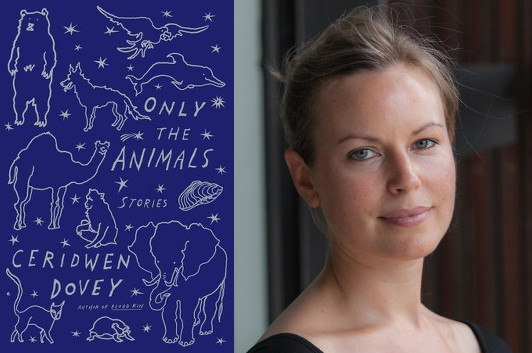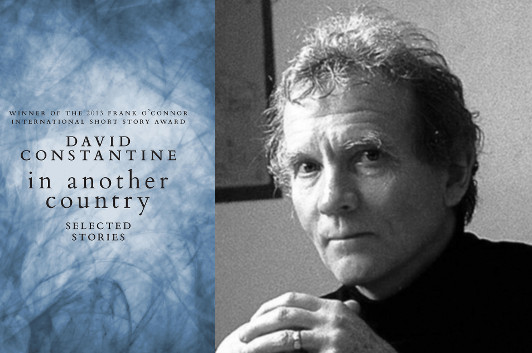Ceridwen Dovey: Colette’s Ultimate Outsiders

photo: Shannon Smith
As Ceridwen Dovey notes in this guest post, not only are the stories in Only the Animals narrated by animals, but each story draws upon a different writer for inspiration. A camel accompanies the Australian short story writer Henry Lawson on a fateful desert trek, for example, while Himmler’s dog, taking on his master’s enthusiasm for Hesse-inflected Buddhism, struggles with feelings of confusion and failure after being rejected. Dovey’s ability to take up different voices, and to make each feel utterly convincing, reminds me in some ways of the stories of Jim Shepard—a sense of strangeness and familiarity in equal measure. Here, she describes how one of these stories, in which Colette’s cat is stranded on the Western Front during the First World War, took shape.
Each of the stories in Only the Animals is told through an animal narrator who has died in a human conflict of the past century. Right from the beginning of the project, I knew that writing from an animal’s eye view was territory that many, many other authors had covered. The parrot story was the first I wrote, and at the time I was reading J.M. Coetzee’s The Lives of Animals, and while doing research for the story I went back to the original Flaubert story about a woman’s relationship with a parrot, A Simple Heart.
I was searching for a way for the stories not to be relentlessly depressing. So I decided that each animal soul should also pay tribute to an author who has worked in this symbolic space before—and in this way put a bit of hope and humour in the stories, to signal that some of our best writers have tried to find a way to say something meaningful through animal characters.
I knew that I wanted to write a story set in the trenches during World War One, when many of the soldiers at the front kept pets—cats, dogs, rats, pigeons—to keep up their morale. I’d heard a story about the French turn-of-the-century author and music hall performer, Colette, having had a close relationship with her cat, but I’d never read her work myself. I went to the library and took out every book by her that they had on the shelves.
15 September 2015 | selling shorts |
David Constantine: A New Center of Attention
When you start reading In Another Country, it’s the precision of David Constantine’s prose that gets you first. His descriptions, his dialogue—it’s all so unnervingly exact, dropping you into scenes that are both immediately recognizable and profoundly unsettling. And one consequence of this exactitude is that you simply can’t skim a Constantine story. There’s that school of thought that every detail in a short story should be an essential detail, but actual stories live up to that theory to varying degrees—the point being that Constantine’s best work, as represented in this career-spanning collection (which includes stories from the Frank O’Connor International Short Story Award-winning Tea at the Midland), hits that mark with riveting consistency. In this guest post, he explains the purpose behind this careful approach to language, a literary purpose that’s equal parts aesthetic and philosophical.
The phrase is Lawrence’s: “The essential quality of poetry is that it makes a new effort of attention.” So does fiction. And, doing it, poems and stories ask us to do the same: attend better. I associate that demand with Lear’s shocked utterance when he is evicted out of kingship onto the heath and begins to notice that the poor have a hard time of it: “O, I have ta’en / Too little care of this …” We all take too little care. Fiction and poetry jolt us into caring more. They widen our sympathy.
In practice the new effort of attention will most often have a polemical edge because it will alert us to the state we are in. The declaration that citizens have the right to life, liberty and the pursuit of happiness cannot be un-declared. So, alerted, paying attention, we look around us and see, at best, that the aspiration has been very imperfectly realized, and, at worst, that much has been done to make its realization unlikely or downright impossible.
Fiction and poetry continually remind us that we do not (are not permitted to, don’t try hard enough to) live as connectedly, wholly, humanely as we might. They help us imagine a livelier life.They do this intrinsically first by practising the autonomy without which no artistic creation is possible. That autonomy contradicts and challenges the unfreedom which in various forms (some more obvious than others) reduces our lives in society. And secondly, a poem or story unsettles us by its own truth and beauty because it confronts us with that famous pairing all too often in circumstances of very great ugliness and mendacity (trashed environment, debased public discourse and conduct, for example). Fiction and poetry by their intrinsic workings urge us not to give up the hope of freedom, truth and beauty. In fact, they incite us to revolt.
14 June 2015 | selling shorts |


 Our Endless and Proper Work is my new book with Belt Publishing about starting (and sticking to) a productive writing practice.
Our Endless and Proper Work is my new book with Belt Publishing about starting (and sticking to) a productive writing practice. 
